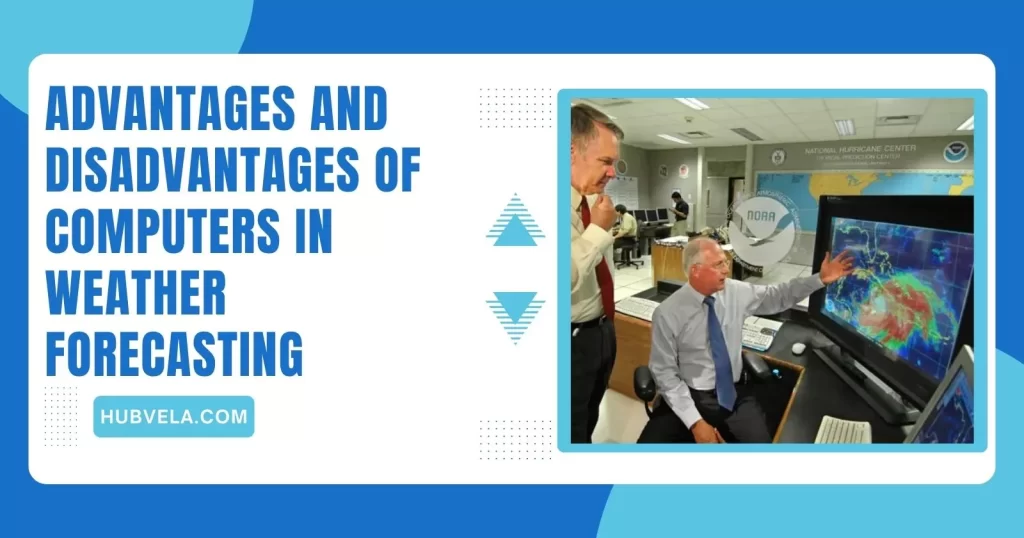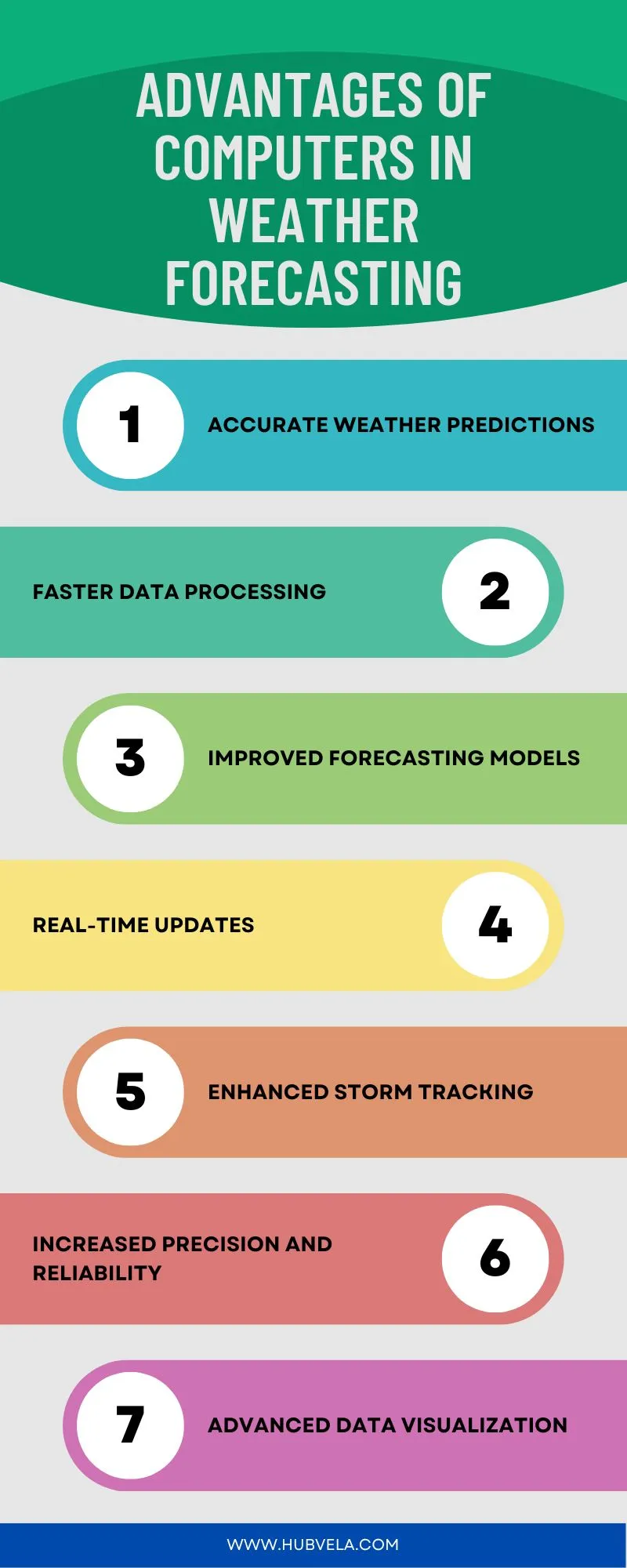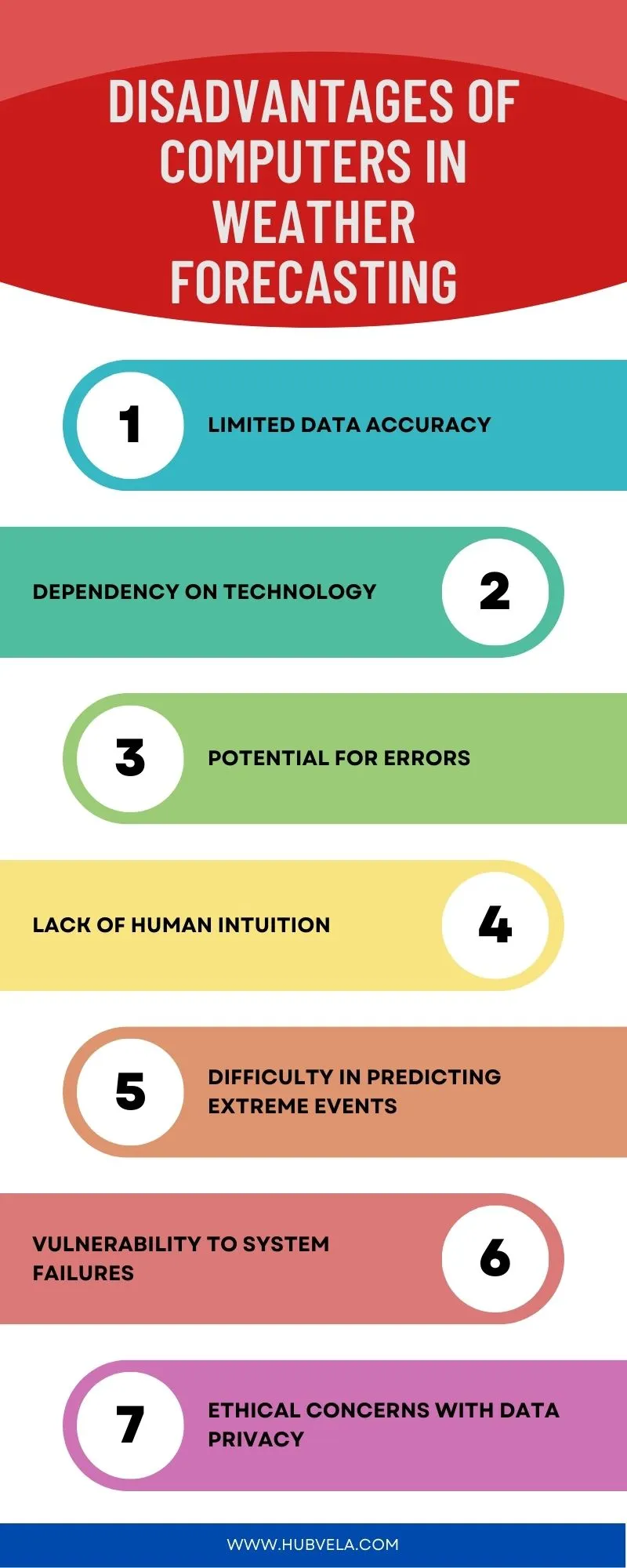Have you ever wondered how computers play a crucial role in weather forecasting? Well, you’re in luck! In this article, we will explore the advantages and disadvantages of computers in weather forecasting.
It’s quite a coincidence that computers have revolutionized this field, providing accurate weather predictions and faster data processing. With improved forecasting models and real-time updates, you can stay informed about changing weather conditions.
However, there are also some drawbacks to consider. Computers face difficulty in predicting extreme events, making us vulnerable to unexpected weather phenomena. Additionally, system failures can disrupt the accuracy and reliability of forecasts. Furthermore, there are ethical concerns surrounding data privacy.
By understanding both the advantages and disadvantages, you can gain a comprehensive understanding of the role of computers in weather forecasting.

--Advertisement--
Advantages of Computers in Weather Forecasting
The use of computers in weather forecasting has significantly improved the accuracy and efficiency of predicting weather conditions. We will discuss the advantages of computers in weather forecasting.

1. Accurate Weather Predictions
With the help of advanced technology, you can rely on computers for accurate weather predictions.
Improving algorithms, satellite imagery, machine learning techniques, and data analysis have greatly enhanced the accuracy of weather forecasts.
Computers can process vast amounts of data and apply complex mathematical models to generate predictions.
Technological advancements have also allowed for real-time monitoring and updates, ensuring that forecasts are more precise and up-to-date.
Thanks to computers, you can now plan your activities with confidence, knowing that the weather predictions are reliable.
2. Faster Data Processing
Thanks to advanced technology, you can now benefit from faster data processing in weather forecasting with computers. This advancement has led to improved efficiency and increased productivity in the field.
With faster data processing, the waiting time for weather forecasts has been significantly reduced, allowing for quicker decision-making.
Additionally, computers’ enhanced analysis capabilities enable meteorologists to analyze large amounts of data more effectively, leading to more accurate and reliable weather predictions.
3. Improved Forecasting Models
You can benefit from improved forecasting models in weather forecasting with the use of computers.
These improved models leverage advanced data analysis techniques and technological advancements to enhance predictive accuracy.
By incorporating the vast amount of data collected from various sources, computers can generate more precise and reliable forecasts.
These models also enable meteorologists to employ sophisticated forecasting techniques, such as ensemble forecasting and numerical weather prediction, leading to more accurate and timely weather predictions.
4. Real-Time Updates
By continuously analyzing and processing incoming data, computers provide meteorologists with real-time updates, allowing for more accurate and up-to-date weather forecasts.
Real-time monitoring and data analysis enable meteorologists to track the latest weather patterns and make adjustments to their predictions as needed.
This level of forecasting accuracy is made possible by the technological advancements in data integration, which allows for the seamless integration of various sources of weather data.
As a result, meteorologists can provide more reliable and timely weather forecasts to the public.
5. Enhanced Storm Tracking
Computers enhance storm tracking capabilities by analyzing real-time data, allowing meteorologists to accurately monitor and predict the path and intensity of storms. With advanced data visualization, meteorologists can visualize complex weather patterns and identify potential storm formations.
However, there are limitations to data accuracy, as some weather data may be incomplete or unreliable. Additionally, computers are vulnerable to system failures, which can disrupt storm tracking operations.
There are also ethical concerns regarding data privacy, as personal information may be collected and used without consent.
6. Increased Precision and Reliability
With enhanced storm tracking capabilities, computers in weather forecasting increase precision and reliability in predicting the path and intensity of storms.
Through increased efficiency and improved accuracy, advanced algorithms enable meteorologists to analyze vast amounts of data and make reliable predictions.
These computers use enhanced forecasting techniques to interpret complex weather patterns and provide timely and accurate forecasts.
This not only helps in saving lives and property, but also allows for better planning and preparation for severe weather events.
7. Advanced Data Visualization
Enhanced data visualization capabilities allow you to easily interpret and analyze complex weather patterns in computerized weather forecasting. With advanced data visualization techniques and interactive user interfaces, you can effectively perform data analysis and data interpretation tasks.
Disadvantages of Computers in Weather Forecasting
Weather forecasting using computers and advanced technologies has revolutionized the accuracy and timeliness of predictions. We will explore some of the major disadvantages of using computers in weather forecasting.

1. Limited Data Accuracy
Computers in weather forecasting have the disadvantage of limited data accuracy. This is mainly due to data limitations and measurement accuracy. Although data collection methods have improved over the years, there are still challenges in obtaining accurate and complete data.
Additionally, forecasting techniques heavily rely on data interpretation, which can introduce errors and uncertainties. Therefore, it’s important to acknowledge the limitations of computer-based weather forecasting and use them as a tool rather than relying solely on their predictions.
2. Dependency on Technology
One major drawback of relying on computers for weather forecasting is the inherent dependency on technology.
While computers have revolutionized the field of weather forecasting, their reliance on technology poses several challenges.
One such challenge is the issue of data integrity, as computers are vulnerable to errors and glitches that can compromise the accuracy of forecasts.
Additionally, computers lack the human expertise and intuition that meteorologists possess, leading to forecasting limitations.
Moreover, the system vulnerabilities of computers make them susceptible to cyber attacks and other technological failures, further undermining their reliability in weather forecasting.
3. Potential for Errors
To understand the potential for errors in weather forecasting using computers, you must consider the limitations of technology.
Despite advancements, there are still potential errors in the process. Data inconsistencies can arise due to incomplete or inaccurate information, leading to uncertain predictions.
Furthermore, computers can generate unreliable forecasts if the algorithms or models used are flawed. Information distortion is another concern, as the interpretation of data can be subjective, leading to incorrect forecasts.
These factors highlight the need for human expertise in weather forecasting.
4. Lack of Human Intuition
You may find a lack of human intuition in weather forecasting using computers.
While computers excel at data analysis and creating predictive models, they lack the human decision-making abilities that can be crucial in accurately forecasting the weather.
Humans have the intuition to interpret weather patterns and make adjustments based on their experience and knowledge. This human touch is often missing in computer-generated forecasts, which can lead to decreased forecasting accuracy.
5. Difficulty in Predicting Extreme Events
Predicting extreme events using computers in weather forecasting can be challenging.
Extreme weather events and unpredictable phenomena pose significant forecasting challenges.
Computers struggle to accurately predict these events due to uncertain predictions and complex atmospheric conditions. The intricate nature of extreme weather makes it difficult for computers to capture all the variables and intricacies involved.
As a result, forecasters must rely on a combination of computer models and human expertise to improve the accuracy of extreme weather predictions.
6. Vulnerability to System Failures
How can computers in weather forecasting be vulnerable to system failures?
Unfortunately, like any other technology, computers used in weather forecasting aren’t immune to system failures. Software vulnerabilities, technical glitches, data corruption, and operational disruptions can occur, leading to inaccurate or delayed weather forecasts.
These system failures can be caused by various factors, such as hardware malfunctions, software bugs, or even cyber attacks.
As a result, it’s crucial for meteorologists to have backup systems and contingency plans in place to minimize the impact of such failures.
7. Ethical Concerns With Data Privacy
With computers in weather forecasting, you must be cautious of ethical concerns regarding data privacy.
Data security and privacy concerns arise when personal information is collected and stored without user consent. The ethical implications of this can lead to potential data breaches, where sensitive information is exposed to unauthorized individuals.
It’s crucial to prioritize user consent and implement robust security measures to protect against these ethical concerns and maintain the trust of individuals who rely on weather forecasting services.
Conclusion on Advantages and Disadvantages of Computers in Weather Forecasting
In conclusion, computers have revolutionized weather forecasting by providing faster and more accurate predictions. With the use of Artificial Intelligence and high-performance computing, weather forecasting has become a huge industry today, with a predicted global market worth of nearly USD 4.63 billion by 2025.
However, there are still some disadvantages to using computers in weather forecasting, such as the difficulty in accurately forecasting weather and the expense of monitoring so many variables from various sources.
Despite these challenges, weather forecasting remains a crucial entity for governments and industries like agriculture, marine and aviation logistics, and trade, and the National Weather Service continues to communicate forecasts in a way that helps save lives and property.


